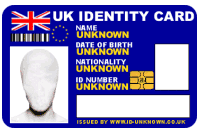ID cards for the UK - Timeline
The road to the introduction of ID cards in the UK has been problematic from the start, with recent announcements complicating government plans further.

6 February 2007: The Conservative Party announces plans to break contracts with IT suppliers for the national ID scheme if elected. The comments of Shadow Home Secretary David Davis are met with heavy criticism from Intellect, the trade association for the UK IT industry.
9 February 2007: Davis responds to the criticism from Intellect, saying that the firm does not understand the depth of his party's opposition to the proposed national ID plan.
12 April 2007: Newly-released figures show that identity theft has increased by almost 70 per cent year-on-year. Experian, the information services firm reporting the rise, claims that company directors and business owners are the most popular targets.
10 May 2007: In the first of two mandatory budget reports to Parliament in 2007, the Home Office predicts the ID scheme will incur start-up costs of 290 million and operational costs of 4.6 billion between 2006 and 2016. These figures are up 40 million from the previous year, a figure "not all that significant" in the overall project.
19 June 2007: A Home Office minister claims ID cards would be a "public good," comparable to railways and the National Grid. Liam Bryne, the Minister for Immigration, Citizenship and Nationality, predicts the identity scheme will be a normal part of life in Britain in 20 years.
10 August 2007: The selection process begins to determine the companies that will be suppliers for the ID card project.
17 August 2007: The Local Government Network suggests that localised ID cards would be safer and cheaper than the national plan. A report issued by the think tank claims that 80 per cent of the public's contact with central government comes through local offices, implying these departments would be better equipped to handle the ID cards.
Get the ITPro daily newsletter
Sign up today and you will receive a free copy of our Future Focus 2025 report - the leading guidance on AI, cybersecurity and other IT challenges as per 700+ senior executives
18 September 2007: Over 50 potential suppliers express interest in the ID card plan at a conference held for bidders in the multi-billion pound ID card contract.
2 October 2007: A trial run of ID cards used in criminal background checks is declared a success by the Home Office. The study by the Criminal Records Bureau and the Identity and Passport Service tested two online services requiring passports or ID cards for background checks of applicants.
19 October 2007: The Identity and Passport Service announces it has narrowed the list of potential suppliers for the ID card project from 11 to eight. The remaining bidders are Accenture, BAE Systems, CSC, EDS, Fujitsu, IBM, Steria and Thales.
8 November 2007: In its twice-annual report to parliament, the Identity and Passport Services announces that the ID card scheme price has fallen. The total cost between April 2007 and April 2017 is now expected to be 5.365 billion for UK citizens, down from the last report's estimate of 5.550 billion
21 November 2007: Questions arise about the safety of ID cardholders' data after HM Revenue and Customs announces two disks containing personal details of 25 million people have gone missing. Proponents of the ID cards claim that a similar accident is not possible with the data on the cards since it is protected by personal biometric information.
3 December 2007: Results of a newspaper poll show that only 43 per cent of respondents favour the ID card plan, down from 78 per cent in the same poll in 2003. The YouGov poll for The Daily Telegraph also showed that 48 per cent of respondents opposed the scheme.
5 December 2007: Information Commissioner Richard Thomas warns a Justice Select Committee to be wary of the ID cards plan. He believes the purpose of the scheme is unclear, which is unacceptable considering the vast amount of data to be collected.
23 January 2008: Leaked documents reveal the Conservative Party's plan to push back the ID card roll-out three years, until after the next election. The news comes after various high-profile data breaches at government departments.
25 January 2008: BAE and Accenture, two leading systems integrators, pull out from the shortlist of bidders for the ID cards contract. Six other companies remain in the running for the contract.
6 March 2008: The Home Office announces delays to the timeline of the ID card plan, with participation for all UK citizens not being necessary for another two years. Home Secretary Jacqui Smith also explains that the bulk of the population will already have new ID cards before they become mandatory.
-
 Bigger salaries, more burnout: Is the CISO role in crisis?
Bigger salaries, more burnout: Is the CISO role in crisis?In-depth CISOs are more stressed than ever before – but why is this and what can be done?
By Kate O'Flaherty Published
-
 Cheap cyber crime kits can be bought on the dark web for less than $25
Cheap cyber crime kits can be bought on the dark web for less than $25News Research from NordVPN shows phishing kits are now widely available on the dark web and via messaging apps like Telegram, and are often selling for less than $25.
By Emma Woollacott Published